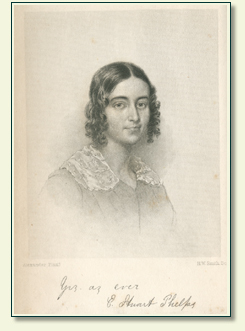|

Elizabeth Stuart Phelps. The Last Leaf from Sunny Side ... with a Memorial of the Author
(1853), frontispiece.
|
ELIZABETH STUART PHELPS (1815
– 1852)
As a child, Elizabeth Stuart Phelps entertained her
younger siblings in their Massachusetts
home by reading aloud her stories, many of which featured especially morbid
and tragic themes. She traveled to Boston
to attend school under the supervision of Reverend Jacob Abbot, and there she
began to publish stories in the religious magazine which he edited. Her work
appeared under the pseudonym "H. Trusta," an anagram of her name
which she used frequently throughout her career. An intensely spiritual young
woman, she considered the arts to be frivolous and abandoned her literary
career in order to pursue a life of Christian duty.
Suffering from a "cerebral disease" whose
symptoms included periods of blindness, headaches, and paralysis, she
returned to her family's home in Andover
in 1834. Eventually softening her draconian attitude toward the arts, she
resumed her writing and painting and her health gradually improved. In 1842
she married Reverend Austin Phelps of Boston,
and, now a mother of three children, she continued to write and publish
novels, many of which were semi-autobiographical accounts of the life of a
clergyman's wife. In 1852 she experienced a relapse of her strange disease,
and she died that autumn.
Some of her novels
enjoyed tremendous success in their day, such as The Sunny Side; or, The Country
Minister's Wife, which ran into multiple editions and appeared in publication on
both sides of the Atlantic. The Angel over the
Right Shoulder,
or The Beginning of a New Year relates the frustrations of women's stifling
domestic duties and has appeared in feminist anthologies. After her death in
1852, her daughter adopted the name "Elizabeth Stuart Phelps" in
her mother's memory and also became a successful novelist.
Another
portrait appears in:
The Ladies’
Repository (June, 1855), plate preceding p. 321.
NEXT>
|


